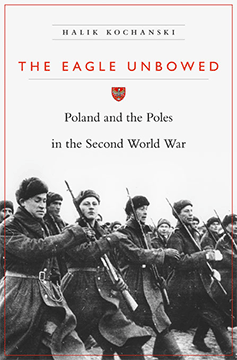By Benjamin Franklin Martin
The fate of Poland was a great tragedy of the twentieth century.
Once the largest kingdom in Eastern Europe, Poland was devoured by its neighbors—Prussia, Austria, and Russia—in three “partitions,” 1772, 1792, and 1795. Their defeat and collapse at the end of World War I permitted the reconstitution of the country in 1919, bringing the Polish people back under Polish rule. Unfortunately, more than a century and a quarter of division left the new nation with multiple law codes, multiple currencies, and the lack of a coherent rail system, thus ensuring economic chaos. Within, disputes among the inexperienced politicians led to a taste for authoritarianism. Without, geography meant grave danger, a resurgent Germany to the west and an aggressive Soviet Union to the east. In 1939, Polish leaders badly misjudged the will of its allies, France and Great Britain, to aid them against Adolf Hitler and ignored the possibility that Josef Stalin would join him in a fourth partition.
Poland’s losses during the September 1939 fighting were 66,300 killed, 133,700 wounded, 694,000 prisoners of war taken by the Germans, and 240,000 prisoners of war taken by the Soviets. These numbers were only the beginning. Edward Rydz-Śmigły, the luckless commander-in-chief of Polish forces, predicted, “Germany will destroy our body, Russia will destroy our soul.” The difference was negligible. For its three-quarters of Poland, the Germans engaged in plunder, exploitation and the attempted obliteration of its culture. For its one-quarter, the Russians adopted an equally brutal “Sovietization.”
The final statistics are staggering: 5.7 million Poles died between 1939 and 1945, 16 percent of the 35 million-prewar population. Because Poland had Europe’s largest Jewish population, Germany undertook the Holocaust largely within its borders. Between June 1941 and December 1943, 90 percent of Polish Jews, about 3 million, died at German hands. In April and May 1940, the Russians executed more than 21,000 Polish officers, professionals, and intellectuals, leaving the bodies in the Katyń forest. They deported another 1 million Poles to the Soviet Union, where nearly 20 percent were dead by the end of 1941.
But there is valor to recount. Although outnumbered and facing far superior weaponry, especially aircraft, the Polish military battled their invaders bravely in September 1939. Afterward, some escaped to fight on, especially for Great Britain. Referring to the Polish pilots flying British Hurricanes against the German Luftwaffe, King George VI remarked in August 1940, “One cannot help feeling that if all our Allies had been Poles, the course of the war. . . would have been very different.” Even more important, Polish cryptographers provided the initial keys to breaking the German Enigma codes and thereby gaining access to Germany’s communications.
At the war’s end, the reward for this valor was subjugation within Stalin’s empire. The process of defeating Germany brought Soviet troops into central Europe, occupying all of what had been prewar Poland. Whatever their sentiments toward the Polish people, American and British leaders had to accept Stalin’s domination of Poland or begin a new war. When Stanisław Mikołajczyk, prime minister of the Polish Government-in-Exile, protested, Winston Churchill exclaimed, “You are absolutely incapable of facing facts. Never in my life have I seen such people.”
Halik Kochanski has brilliantly recounted this tragedy. She betrays her sentiments in writing, “Poland has always considered herself to be at the heart of Europe, the last bulwark of civilization before the alien east began.” Yet she is clear-eyed in recognizing the mistakes Polish leaders committed, even while arguing that the alternatives might well have led to worse. She confronts willingly the role too many Poles played in the Holocaust—quoting an SS officer, “Nowhere in the world is there another nation which has so many heroes and so many denouncers”—and declares that no amount of valor can outweigh such crimes. Thorough, comprehensive, matchless in detail, The Eagle Unbowed is an extraordinary guide through the complicated and contentious history of Poland in the twentieth century.
Benjamin Franklin Martin (ΦΒΚ, Davidson College, 1969) is the Price Professor of History at Louisiana State University and a resident member of the Beta of Louisiana chapter of Phi Beta Kappa.




